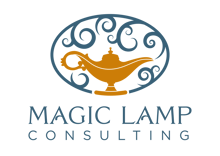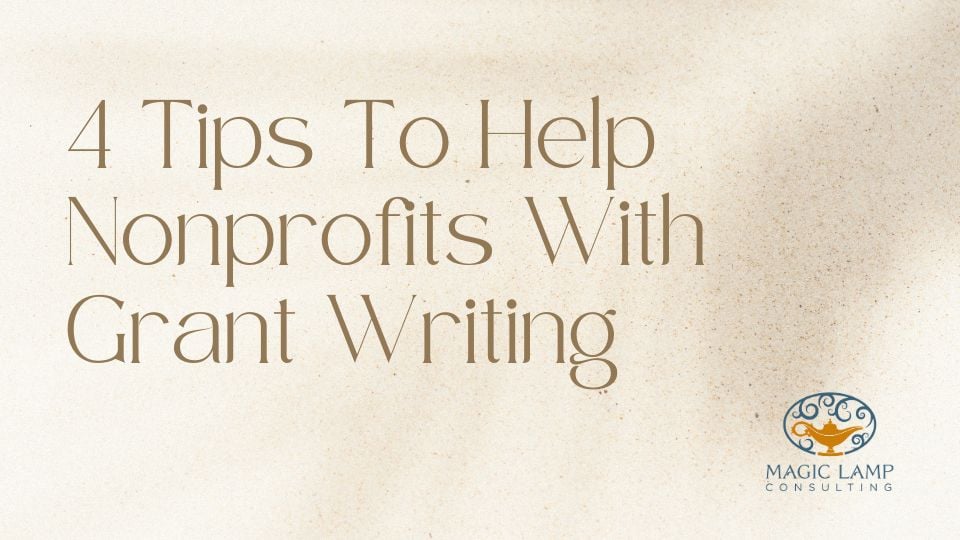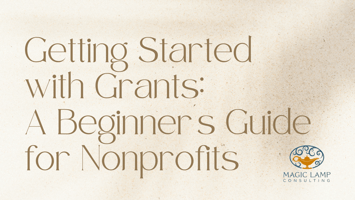Securing grants can be a game-changer for nonprofits, but the competition for funding is fierce. To...
4 Tips To Help Nonprofits with Grant Writing

Nonprofit Executive Directors and Development staff understand first-hand how impactful grant funding can be toward supporting the organization’s mission. However, grant writing can often feel overwhelming for beginners. There are some key concepts and processes that can make writing proposals easier.
This blog post will introduce a few fundamentals of grant writing in order to apply for grants to further the nonprofit’s mission successfully.
Tip #1: Define the Project
It is important to clearly define projects or programs before pursuing grants. This process helps you stay focused on the mission and aligned with the strategic plan in order to avoid mission creep. Mission creep often happens when an organization begins chasing grants and loses focus by taking on new projects or programs that lie slightly outside the core purpose just to get funding. When defining the project, identify the problem to be solved; create a case statement; identify the target audience, define the goals, objectives, outcomes, and how success will be measured.
Tip #2: Develop a Budget
The budget is one of the most essential components of any grant proposal because it outlines exactly how much money the project needs and how funds will be allocated. Most foundations require detailed budgets with line-item costs; therefore, it may take some research into identifying what vendors will be utilized and determine item costs to create an accurate budget breakdown. Prepare a budget justification to explain how the costs were determined and why they are necessary. If vendor quotes are received, they should be included with the application.
Tip #3: Research
Research is one of the most critical aspects in pursuing grants. Good research will save time later in the process, helping ensure time is only spent on submitting relevant grants.
Ways to determine if a funder aligns with the nonprofit’s needs is through grant research. Research criteria include geography, population served, grant focus area, and funding history. It is important to read eligibility requirements carefully so time is not wasted applying for grants that aren’t a strong match to the nonprofit's mission and goals. The Foundation Directory Online is a wonderful research tool, check out their Funding Information Network to find a location near you.
Tip #4: Create a Draft
Once the research is completed, and it is close to when the funder’s grant cycle opens, it is time to draft an application. Read and follow the application guidelines closely. Most grant applications have slightly different ways they ask questions. Ensure each question is answered completely. Watch the character count, most applications limit the number of characters used in each section. Once the first draft is complete, have someone unrelated to the project review it for a clear understanding of the request, accuracy, and to provide feedback before submitting the application.
Grant writing can be intimidating at first but with a little bit of practice, your organization can get started submitting proposals!
Do you have specific questions about the grant writing process? We are here to help. Contact Magic Lamp Consulting for an On-Demand Consulting Session to focus on the specific needs of your organization.
This blog post will introduce a few fundamentals of grant writing in order to apply for grants to further the nonprofit’s mission successfully.
Tip #1: Define the Project
It is important to clearly define projects or programs before pursuing grants. This process helps you stay focused on the mission and aligned with the strategic plan in order to avoid mission creep. Mission creep often happens when an organization begins chasing grants and loses focus by taking on new projects or programs that lie slightly outside the core purpose just to get funding. When defining the project, identify the problem to be solved; create a case statement; identify the target audience, define the goals, objectives, outcomes, and how success will be measured.
Tip #2: Develop a Budget
The budget is one of the most essential components of any grant proposal because it outlines exactly how much money the project needs and how funds will be allocated. Most foundations require detailed budgets with line-item costs; therefore, it may take some research into identifying what vendors will be utilized and determine item costs to create an accurate budget breakdown. Prepare a budget justification to explain how the costs were determined and why they are necessary. If vendor quotes are received, they should be included with the application.
Tip #3: Research
Research is one of the most critical aspects in pursuing grants. Good research will save time later in the process, helping ensure time is only spent on submitting relevant grants.
Ways to determine if a funder aligns with the nonprofit’s needs is through grant research. Research criteria include geography, population served, grant focus area, and funding history. It is important to read eligibility requirements carefully so time is not wasted applying for grants that aren’t a strong match to the nonprofit's mission and goals. The Foundation Directory Online is a wonderful research tool, check out their Funding Information Network to find a location near you.
Tip #4: Create a Draft
Once the research is completed, and it is close to when the funder’s grant cycle opens, it is time to draft an application. Read and follow the application guidelines closely. Most grant applications have slightly different ways they ask questions. Ensure each question is answered completely. Watch the character count, most applications limit the number of characters used in each section. Once the first draft is complete, have someone unrelated to the project review it for a clear understanding of the request, accuracy, and to provide feedback before submitting the application.
Grant writing can be intimidating at first but with a little bit of practice, your organization can get started submitting proposals!
Do you have specific questions about the grant writing process? We are here to help. Contact Magic Lamp Consulting for an On-Demand Consulting Session to focus on the specific needs of your organization.





